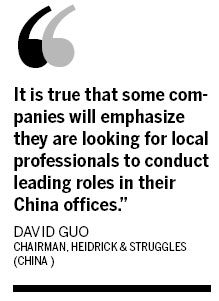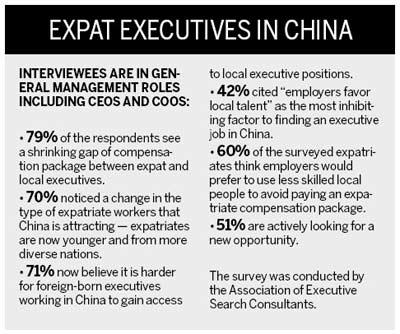Challenge to expats for the top positions
Updated: 2012-12-03 09:45
By Xie Yu and He Wei in Shanghai (China Daily)
|
||||||||
But more foreigners still attracted to pursue their ambitions in China
Most expatriate executives plan to stay in China despite increasing competition from local talent, a recent survey conducted by the Association of Executive Search Consultants found.
According to the survey, 72 percent of the respondents have been working for more than three years in China. During their time here, most of them (70 percent) said they noticed a change in the type of expatriate workers that China is attracting - most are now younger and from more diverse nations.

This indicates that China, as one of the few places that is still experiencing growth in the troubled global economy, is attracting more expat executives from a wide range of demographics to pursue their careers, the AESC survey found.
Fifty expat executives in general management roles including chief executive officers and chief operating officers, responded to the survey. They found themselves facing more severe competition from local counterparts, the survey said.
Most expat executives now believe it is hard for foreign-born executives working in China to gain access to local executive positions (71 percent). They also cited "employers favoring local talent" as the most inhibiting factor to finding an executive job in China (42 percent). As much as 79 percent of the respondents also see a shrinking compensation package gap between expat and local executives.
David Guo, chairman at Heidrick & Struggles (China), the first executive search firm to enter China, said local executives are increasingly popular in foreign companies nowadays.
"It is true that some companies will emphasize they are looking for local professionals to conduct leading roles in their China offices," he said.
It has been more than 30 years since China started reform and opening up. More and more Chinese people are going abroad and speak very fluent English so language is no longer a barrier for Chinese people to work in overseas companies, Guo said.
"Local executives are more familiar with China's market and culture while expat executives are stronger in international operations and communications with headquarters," Guo said.
A growing number of companies in Asia-Pacific are seeing the increasing allure of local talent, said Brian Sullivan, chief executive officer of CTPartners, a New York-headquartered human res ources firm specializing in top executive recruitment.
As companies in the region now face stronger competitive pressures and slightly weakening demand, they need the kind of sophisticated senior leadership talent that can devise and implement winning business strategies, Sullivan said.
On top of that, a deep understanding of the market becomes a priority.
"The first preference goes to a local national candidate, with the second preference going to a regional executive with local language skills and cultural knowledge," he said.
Within this talent market landscape, the experienced and senior Chinese executive will enjoy some of the greatest demand and also command the attendant compensation package.
Peter Felix, president of AESC, said expat executives in China still enjoy a competitive edge in many ways. To stay ahead of the game, he recommends that expat executives invest in their cultural skills, Chinese social networks and especially language capabilities so that they may become more easily considered for top management positions in either local or multinational corporations.
In fact, there are more opportunities for them in Chinese companies. Guo pointed out that local companies with an ambition to conquer overseas markets, like Chinese home appliance giant Haier, have already hired foreign senior executives to broaden their horizons and better manage the overseas market.
Despite the increasing competition from local talent, the expatriate job market in China is more active than ever. More than half (51 percent) of the expat executives surveyed said they are actively looking for a new opportunity and 39 percent of them are open to considering new opportunities.

xieyu@chinadaily.com.cn
- Global talent hunt for 'dream' jobs
- Headhunters drafted to search for talent
- Better environment to attract overseas Chinese
- More green cards to woo overseas talent
- Work visa proposals considered
- New visa policy to attract talent
- Overseas talents help China shift growth pattern
- China promises policies to lure overseas talents

 Relief reaches isolated village
Relief reaches isolated village
 Rainfall poses new threats to quake-hit region
Rainfall poses new threats to quake-hit region
 Funerals begin for Boston bombing victims
Funerals begin for Boston bombing victims
 Quake takeaway from China's Air Force
Quake takeaway from China's Air Force
 Obama celebrates young inventors at science fair
Obama celebrates young inventors at science fair
 Earth Day marked around the world
Earth Day marked around the world
 Volunteer team helping students find sense of normalcy
Volunteer team helping students find sense of normalcy
 Ethnic groups quick to join rescue efforts
Ethnic groups quick to join rescue efforts
Most Viewed
Editor's Picks

|

|

|

|

|

|
Today's Top News
Health new priority for quake zone
Xi meets US top military officer
Japan's boats driven out of Diaoyu
China mulls online shopping legislation
Bird flu death toll rises to 22
Putin appoints new ambassador to China
Japanese ships blocked from Diaoyu Islands
Inspired by Guan, more Chinese pick up golf
US Weekly

|

|







